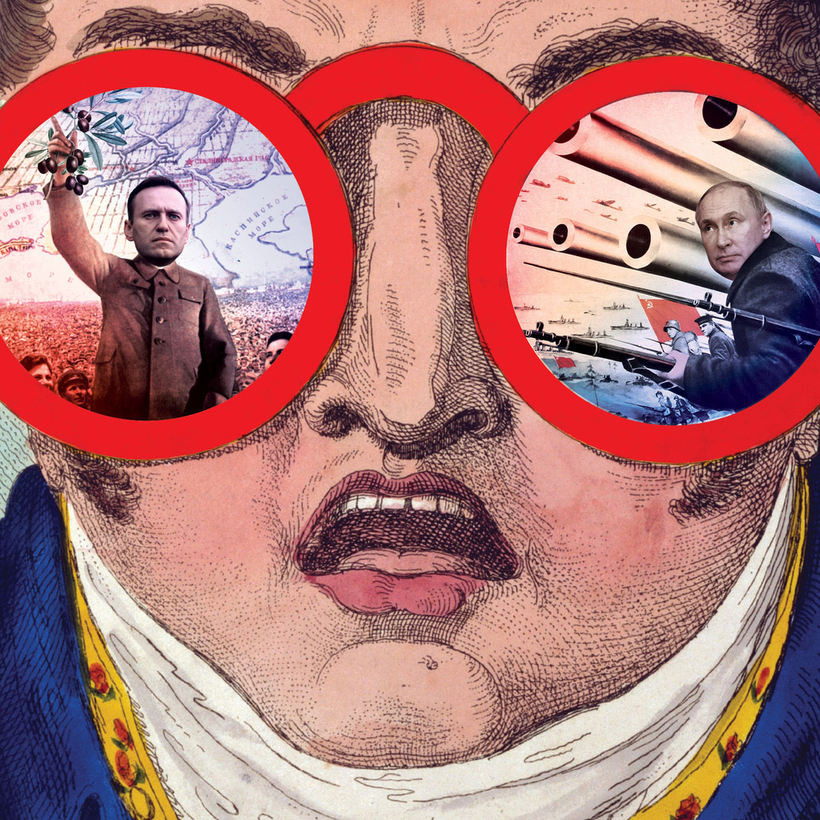Vladimir Putin’s enemy No. 1, Alexei Navalny, survived persecution, arrests, and an attack with a poisonous nerve agent before returning to Moscow, where a court swiftly sentenced him to two and a half years in prison. Days after his arrest, Navalny aired a shocking exposé of the Russian president’s alleged Pharaonic private palace, a video that went so viral it was seen by one out of four Russians. Despite a brutal crackdown that followed, his supporters wouldn’t stop agitating against Putin.
It seemed that Putin just couldn’t catch a break, until now. And, weirdly, it wasn’t the secret police that tripped up Navalny; it was woke piety in the West.
When Navalny flew back to Moscow—after nearly dying in a German hospital—and was summarily convicted by a Russian court, Amnesty International awarded the opposition leader the status of “prisoner of conscience.” On February 23, it became known that Amnesty International had rescinded the designation, saying that it couldn’t condone inflammatory comments Navalny made more than a decade ago, when he co-led a fledgling nationalist movement. It was a blow to Navalny, who, like Sakharov before him, seemed like a leading candidate for the Nobel Peace Prize.
And, weirdly, it wasn’t the secret police that tripped up Navalny; it was woke piety in the West.
February 23 is Defender of the Fatherland Day in Russia, a military holiday turned into a celebration of men being men. On that day this year, the Russian president got a gift that didn’t come from an F.S.B. biological-weapons lab hidden beneath the Siberian permafrost or from a prison shank; it came from a high-priced Tribeca apartment, where Katya Kazbek (real name Ekaterina Dubovitskaya), the daughter of the founder of Russia’s version of Circuit City, resides and opines.
Despite her wealth and privileged perch in downtown Manhattan, Kazbek has been a provocative voice on social media, where she expresses disgust for Western capitalism.
She has degrees from Columbia and Oxford (or, as she puts it, “two imperialist institutions”) and is represented by the Andrew Wylie literary agency. (Her book is a queer coming-of-age story set in post-Soviet Moscow that has yet to be published.) Kazbek is also a writer for RT, the Russian state-owned propaganda network that Putin created in 2005. (F.Y.I.: I have been highly critical of her on Twitter, and she has responded in kind.)

Her writings for RT include columns on the nationalist agenda of many Belarusian protesters (her take: they were whitewashed by Western state-funded media) and, not surprisingly, the absurdity of Russiagate (a “myth”). And when it came to the plutocratic palace on the Black Sea that Navalny accused Putin of building, Kazbek appeared to side with Putin, arguing that it looks like a hotel.
Kazbek is a provocative voice on social media, where she expresses disgust for Western capitalism.
So, perhaps not surprisingly, when Navalny was designated a prisoner of conscience by Amnesty International, Kazbek set her sights on the leader of the Russian opposition.
It’s no secret that Navalny’s political career started in nationalism. He founded the Narod movement, which advocated for anti-immigrant measures and the right of citizens to bear arms. His remarks were controversial, to say the least: back in the 2000s he wanted to expel some immigrants and compared them to cockroaches.
Ms. Kazbek posted two inflammatory videos on her Twitter feed and started disseminating them among her left-of-left followers. Fluent in Western cultural discourse, she attacked Navalny in the most American way possible—by unearthing his decade-old YouTube videos in an effort to cancel him in the eyes of progressive democrats in Europe and the United States.
What followed looked like a coordinated e-mail campaign targeting Amnesty International. The organization was flooded with e-mails, some of which contained a link to Kazbek’s tweets and a link to Navalny’s video from 2007. Reached by e-mail, Kazbek denied lobbying Amnesty International: “I have never knowingly been in touch with anyone who works for Amnesty International.”
Extend an olive branch to Putin and he’ll find a way to weaponize it. Sure enough, the latest cultural trends in New York and Los Angeles became a back door for the Kremlin to discredit its No. 1 critic. Amnesty International, “bound by their own principles,” as the director of their Moscow office, Natalia Zvyagina, said, rescinded Navalny’s designation as a prisoner of conscience. That set off alarm bells across the globe. On Friday, Julie Verhaar, the acting secretary general of Amnesty International, announced that the organization would conduct an internal investigation into the about-face.
A tactic that failed to work in Soviet times, when the K.G.B. tried to discredit dissidents who fled the regime, worked like a charm in 2021. The head of RT, Margarita Simonyan, gloated, “Amnesty International excluded Navalny from its list of prisoners of conscience. Liberals are screaming that it happened after one of our columnists showed concrete evidence that [Navalny] is a Nazi. Happy Defender of the Fatherland day, compatriots!”
Extend an olive branch to Putin and he’ll find a way to weaponize it.
Ms. Zvyagina said that, should Navalny issue an apology and denounce his previous statements, it might improve his status with the organization. However, one can’t ignore the irony that Navalny’s current predicament—he’s been recently transferred to a penal colony east of Moscow—might hamper him from doing so in the near future.
During the Cold War, a term was used to describe Westerners susceptible to Kremlin manipulation: “useful idiot.” It’s often attributed to Vladimir Lenin. To Putin, it doesn’t matter if his mouthpiece in the West is woke, alt-left, or alt-right, as long as the idiot has a use.
Andrew Ryvkin is a Moscow-based Russian-American journalist and screenwriter


